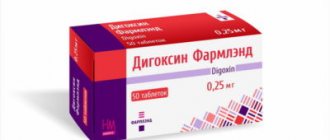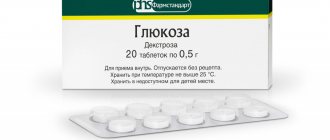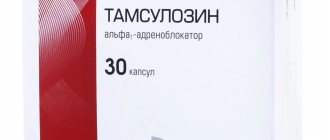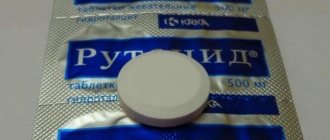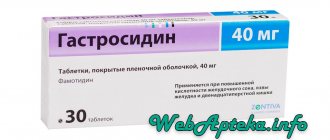Write a review
Reviews: 0
Manufacturers: Ozone (Russia)
Active ingredients
- Betagistine
Disease class
- Vertebrobasilar arterial system syndrome
- Vascular cerebrovascular syndromes in cerebrovascular diseases (I60-I67*)
- Encephalopathy, unspecified
- Meniere's disease
- Vestibular function disorder, unspecified
- Inner ear disease, unspecified
- Other hearing loss
- Cerebral atherosclerosis
- Consequences of cerebrovascular diseases
- Consequences of intracranial injury
- Surgical practice
Clinical and pharmacological group
- Not indicated. See instructions
Pharmacological action
- Improves microcirculation
- Histamine-like
Pharmacological group
- Angioprotectors and microcirculation correctors
- Histaminomimetics
Pharmacodynamics and pharmacokinetics
The drug has a direct agonistic effect on H1 receptors in the vessels of the inner ear and H3 histamine receptors in the vestibular nuclei of the nervous system. An improvement in capillary permeability and microcirculation was also noted, and endolymph pressure was normalized. At the same time, there is an increase in blood flow in the basilar artery.
When treated with Vescap, vestibular function is restored more quickly as a result of unilateral vestibular neurectomy, and central vestibular compensation is accelerated and facilitated.
This drug is characterized by a pronounced central effect, a decrease in the generation of influence potentials in the neurons of the medial and lateral vestibular nuclei, and relief of symptoms in vestibular vertigo and Meniere's syndrome.
Inside the body, the drug is quickly absorbed, slightly binding to plasma proteins. The maximum concentration in plasma is detected after 3 hours. As a result of metabolism, inactive metabolites are formed. The main part of the drug is excreted by the kidneys in the form of metabolites and a small part - unchanged.
pharmachologic effect
Vesticap is a synthetic analogue of histamine. Betahistine acts primarily on histamine H1 and H3 receptors in the inner ear and vestibular nuclei of the central nervous system.
Through a direct agonistic effect on the H1 receptors of the vessels of the inner ear, as well as indirectly on the H3 histamine receptors of the vestibular nuclei of the central nervous system; improves microcirculation and capillary permeability, normalizes endolymph pressure in the labyrinth and cochlea. At the same time, betahistine increases blood flow in the basilar artery. Accelerates the restoration of vestibular function after unilateral vestibular neurectomy, accelerating and facilitating central vestibular compensation (due to antagonism with H3-histamine receptors). It has a pronounced central effect, being an inhibitor of H3 receptors in the nuclei of the vestibular nerve. Dose-dependently reduces the generation of action potentials in neurons of the lateral and medial vestibular nuclei.
Relieves symptoms of Meniere's syndrome and vestibular vertigo. A stable therapeutic effect occurs after 14 days.
Pharmacokinetics
Suction and distribution
After taking the drug orally, betahistine is rapidly absorbed, and plasma protein binding is low. Time to reach Cmax in plasma is 3 hours.
Metabolism and excretion
Metabolized to inactive metabolites: 2-pyridylacetic acid (the main metabolite) and demethylbetagistine.
85-90% is excreted by the kidneys in the form of 2-pyridylacetic acid within 24 hours. Excretion of betahistine and demethylbetagistine by the kidneys is insignificant. Only a small part of betahistine and its metabolites is excreted through the intestines.
Reviews about Vesticap
Drugs with similar effects are often discussed online. At the same time, reviews about Vesticap are very varied. However, in most cases they are still positive.
According to users, this drug can be prescribed to patients with chronic headaches and tinnitus. The cause of these symptoms is usually high intracranial pressure. Taking Vesticap helps normalize blood pressure and relieve unwanted symptoms.
This drug is also taken by people with disorders of the vestibular apparatus. After a course of treatment, many people note a significant improvement in their condition.
In addition, Vesticap is a drug that is part of complex therapy for vegetative-vascular dystonia. As a result, weakness and dizziness disappear, and the general condition normalizes.
However, most patients say that no side effects develop, although in isolated cases severe nausea may occur. As experts point out, if there is no improvement for a long time or unpleasant symptoms appear, then you need to consult a doctor.
Contraindications
- Hypersensitivity to any of the components of the drug
- Pregnancy
- Lactation period (due to lack of data)
- Childhood
- Lactose intolerance, lactase deficiency and glucose-galactose malabsorption syndrome
With caution: peptic ulcer of the stomach or duodenum (including a history), pheochromocytoma, bronchial asthma. Patients in these groups should be monitored regularly during treatment.
Vesticap
Manufacturer: OZONE LLC (Russia)
caps. 24 mg: 10, 20, 30, 40, 50, 60, 80, 90, 100, 120 or 150 pcs. Reg. No.: LP-001642
Clinical and pharmacological group:
A drug that improves microcirculation of the labyrinth, used for pathology of the vestibular apparatus
Release form, composition and packaging
Capsules
No. 0, light blue body, opaque, light blue cap, opaque; the contents of the capsules are a mixture of powder and granules of white or white with a creamy tint; It is allowed to compact the contents of the capsule according to the shape of the capsule, disintegrating when pressed.
| 1 caps. | |
| betahistine dihydrochloride | 24 mg |
Excipients:
lactose monohydrate (milk sugar) 129 mg, microcrystalline cellulose 70.5 mg, potato starch 30 mg, copovidone 27 mg, sodium carboxymethyl starch 15 mg, colloidal silicon dioxide 1.5 mg, magnesium stearate 3 mg.
Capsule composition:
cap - indigo carmine 0.0312%, titanium dioxide 4%, gelatin up to 100%; body - indigo carmine 0.0312%, titanium dioxide 4%, gelatin up to 100%.
10 pieces. — cellular contour packages (1) — cardboard packs. 10 pieces. — contour cell packaging (2) — cardboard packs. 10 pieces. — cellular contour packages (3) — cardboard packs. 10 pieces. — contour cell packaging (4) — cardboard packs. 10 pieces. — contour cell packaging (5) — cardboard packs. 20 pcs. — cellular contour packages (1) — cardboard packs. 20 pcs. — contour cell packaging (2) — cardboard packs. 20 pcs. — cellular contour packages (3) — cardboard packs. 20 pcs. — contour cell packaging (4) — cardboard packs. 20 pcs. — contour cell packaging (5) — cardboard packs. 30 pcs. — cellular contour packages (1) — cardboard packs. 30 pcs. — contour cell packaging (2) — cardboard packs. 30 pcs. — cellular contour packages (3) — cardboard packs. 30 pcs. — contour cell packaging (4) — cardboard packs. 30 pcs. — contour cell packaging (5) — cardboard packs. 10 pieces. — polymer containers (1) — cardboard packs. 20 pcs. — polymer containers (1) — cardboard packs. 30 pcs. — polymer containers (1) — cardboard packs. 40 pcs. — polymer containers (1) — cardboard packs. 50 pcs. — polymer containers (1) — cardboard packs. 100 pieces. — polymer containers (1) — cardboard packs.
Description of the active components of the drug "Vestikap"
pharmachologic effect
An agonist of histamine H1 receptors and an antagonist of H3 receptors in the vestibular nuclei of the central nervous system. By relaxing the precapillary sphincters of the vessels of the inner ear, it improves blood circulation in the vascular striatum of the inner ear.
Dose-dependently reduces the generation of action potentials in neurons of the lateral and medial vestibular nuclei.
Accelerates the restoration of vestibular function after unilateral vestibular neurectomy, accelerating and facilitating central vestibular compensation (due to antagonism with H3-histamine receptors).
Relieves symptoms of Meniere's syndrome and vestibular vertigo. A stable therapeutic effect occurs after 14 days.
Indications
- treatment of Meniere's syndrome, characterized by dizziness (accompanied by nausea and vomiting), hearing loss and tinnitus;
- symptomatic treatment of vestibular dizziness (vertigo).
Dosage regimen
Orally, during meals, 1 capsule (24 mg) 2 times a day.
The treatment is long-term. The duration of taking the drug is selected individually.
No dose adjustment is required in elderly people.
Side effect
From the digestive system:
nausea, vomiting, abdominal pain, bloating.
From the skin:
angioedema, urticaria, itching, rash.
Allergic reactions:
hypersensitivity, incl. anaphylactic reactions.
From the nervous system:
headache.
Contraindications
- hypersensitivity to any of the components of the drug;
- pregnancy;
- lactation period;
- pheochromocytoma;
- children under 18 years of age;
- lactose intolerance, lactase deficiency and glucose-galactose malabsorption syndrome.
Carefully :
peptic ulcer of the stomach or duodenum (including a history), bronchial asthma.
Pregnancy and lactation
The use of the drug is contraindicated during pregnancy and lactation.
Use in old age
No dose adjustment is required for elderly people.
Application for children
Contraindication: children under 18 years of age.
special instructions
The therapeutic effect in some cases increases within several months from the start of treatment.
Impact on the ability to drive vehicles and operate machinery
No or negligible impact.
Overdose
Symptoms:
nausea, abdominal pain, drowsiness (when taken at a dose of up to 640 mg); convulsions, cardiovascular complications (when taken at a dose of more than 640 mg or in combination with other drugs).
Treatment:
symptomatic.
Drug interactions
The interaction of betahistine with histamine H1 receptor blockers when used concomitantly may theoretically affect the effectiveness of one of these drugs.
Conditions for dispensing from pharmacies
The drug is available with a prescription.
Storage conditions and periods
The drug should be stored in a dry place, protected from light, out of reach of children, at a temperature not exceeding 25°C. Shelf life: 3 years. Do not use after expiration date.
Drug interactions
The interaction of betahistine with histamine H1 receptor blockers when used concomitantly may theoretically affect the effectiveness of one of these drugs.
Similar drugs:
- Vasoserc Oral tablets
- Vestibo Oral tablets
- Betahistine Oral tablets
- Tagista Oral tablets
- Betaver Oral tablets
- Asniton Oral tablets
- Microser Oral tablets
- Microser Drops for oral administration
** The Drug Directory is intended for informational purposes only. For more complete information, please refer to the manufacturer's instructions. Do not self-medicate; Before starting to use Vesticap, you should consult a doctor. EUROLAB is not responsible for the consequences caused by the use of information posted on the portal. Any information on the site does not replace medical advice and cannot serve as a guarantee of the positive effect of the drug.
Are you interested in the drug Vesticap? Do you want to know more detailed information or do you need a doctor's examination? Or do you need an inspection? You can make an appointment with a doctor - the Euro lab is always at your service! The best doctors will examine you, advise you, provide the necessary assistance and make a diagnosis. You can also call a doctor at home . Euro lab clinic is open for you around the clock.
** Attention! The information presented in this medication guide is intended for medical professionals and should not be used as a basis for self-medication. The description of the drug Vestikap is provided for informational purposes and is not intended for prescribing treatment without the participation of a doctor. Patients need to consult a specialist!
If you are interested in any other drugs and medications, their descriptions and instructions for use, information about the composition and form of release, indications for use and side effects, methods of use, prices and reviews of drugs, or you have any other questions and suggestions - write to us, we will definitely try to help you.
Vestikap
Manufacturer: OZONE LLC (Russia)
caps. 8 mg: 10, 20, 30, 40, 50, 60, 80 or 100 pcs. Reg. No.: LSR-009120/10
Clinical and pharmacological group:
A drug that improves microcirculation of the labyrinth, used for pathology of the vestibular apparatus
Release form, composition and packaging
Capsules
No. 2: light blue body, opaque, opaque blue cap; the contents of the capsules are a mixture of powder and granules of white or white with a creamy tint; It is allowed to compact the contents of the capsule according to the shape of the capsule, disintegrating when pressed.
| 1 tab. | |
| betahistine dihydrochloride | 8 mg |
Excipients:
lactose monohydrate (milk sugar) 43 mg, microcrystalline cellulose 23.5 mg, potato starch 10 mg, copovidone 9 mg, sodium carboxymethyl starch 5 mg, colloidal silicon dioxide 0.5 mg, magnesium stearate 1 mg.
Capsule composition:
indigo carmine dye, titanium dioxide, gelatin.
10 pieces. — cellular contour packages (3) — cardboard packs. 30 pcs. — polymer containers (1) — cardboard packs. 10 pieces. — polymer containers (1) — cardboard packs. 40 pcs. — polymer containers (1) — cardboard packs. 50 pcs. — polymer containers (1) — cardboard packs. 100 pieces. — polymer containers (1) — cardboard packs. 10 pieces. — cellular contour packages (1) — cardboard packs. 10 pieces. — contour cell packaging (2) — cardboard packs. 10 pieces. — contour cell packaging (4) — cardboard packs. 10 pieces. — contour cell packaging (5) — cardboard packs. 10 pieces. — contour cell packaging (6) — cardboard packs. 10 pieces. — contour cell packaging (8) — cardboard packs. 10 pieces. — contour cell packaging (10) — cardboard packs. 30 pcs. — cellular contour packages (1) — cardboard packs. 30 pcs. — contour cell packaging (2) — cardboard packs. 30 pcs. — cellular contour packages (3) — cardboard packs. 30 pcs. — contour cell packaging (4) — cardboard packs. 30 pcs. — contour cell packaging (5) — cardboard packs. 30 pcs. — contour cell packaging (6) — cardboard packs. 30 pcs. — contour cell packaging (8) — cardboard packs. 30 pcs. — contour cell packaging (10) — cardboard packs.
Description of the active components of the drug "Vestikap"
pharmachologic effect
Betahistine acts primarily on histamine H1 and H3 receptors in the inner ear and vestibular nuclei of the central nervous system.
Through a direct agonistic effect on the H1 receptors of the vessels of the inner ear, as well as indirectly on the H3 histamine receptors of the vestibular nuclei of the central nervous system; improves microcirculation and capillary permeability, normalizes endolymph pressure in the labyrinth and cochlea. At the same time, betahistine increases blood flow in the basilar artery. Accelerates the restoration of vestibular function after unilateral vestibular neurectomy, accelerating and facilitating central vestibular compensation (due to antagonism with H3-histamine receptors). It has a pronounced central effect, being an inhibitor of H3 receptors in the nuclei of the vestibular nerve. Dose-dependently reduces the generation of action potentials in neurons of the lateral and medial vestibular nuclei.
Relieves symptoms of Meniere's syndrome and vestibular vertigo. A stable therapeutic effect occurs after 14 days.
Indications
- treatment of Meniere's syndrome, characterized by dizziness (accompanied by nausea and vomiting), hearing loss and tinnitus;
- symptomatic treatment of vestibular dizziness (vertigo).
Dosage regimen
Inside, during meals. 8 mg capsules: 1-2 capsules 3 times a day. Capsules 16 mg: 1 capsule 3 times a day.
Improvement is usually noted at the beginning of therapy, a stable therapeutic effect occurs after two weeks of treatment and can increase over several months of treatment. The treatment is long-term. The duration of taking the drug is selected individually.
Side effect
From the digestive system:
nausea, vomiting, abdominal pain, bloating, dyspepsia.
From the skin:
angioedema, urticaria, itching, rash.
Allergic reactions:
hypersensitivity, incl. anaphylactic reactions.
Contraindications
- hypersensitivity to any of the components of the drug;
- pregnancy;
— lactation period (due to lack of data);
- childhood;
- lactose intolerance, lactase deficiency and glucose-galactose malabsorption syndrome.
Carefully :
peptic ulcer of the stomach or duodenum (including a history), pheochromocytoma, bronchial asthma. Patients in these groups should be monitored regularly during treatment.
Pregnancy and lactation
There is insufficient data to assess the effects of the drug during pregnancy and lactation. In this regard, use during pregnancy is not recommended. During treatment it is necessary to stop breastfeeding.
Application for children
Contraindication: children's age.
special instructions
The therapeutic effect in some cases increases within several months from the start of treatment.
Impact on the ability to drive vehicles and operate machinery
Betahistine does not have a sedative effect and does not affect the ability to drive a car or engage in activities that require rapid psychomotor reactions.
Overdose
Symptoms:
nausea, abdominal pain, drowsiness (when taken at a dose of up to 640 mg); convulsions, cardiovascular complications (when taken at a dose of more than 640 mg or in combination with other drugs).
Treatment:
symptomatic.
Drug interactions
There are no known cases of interaction or incompatibility with other drugs.
Conditions for dispensing from pharmacies
The drug is available with a prescription.
Storage conditions and periods
The drug should be stored in a dry place, protected from light, out of reach of children, at a temperature not exceeding 25°C. Shelf life: 3 years. Do not use after expiration date.
Drug interactions
There are no known cases of interaction or incompatibility with other drugs.

